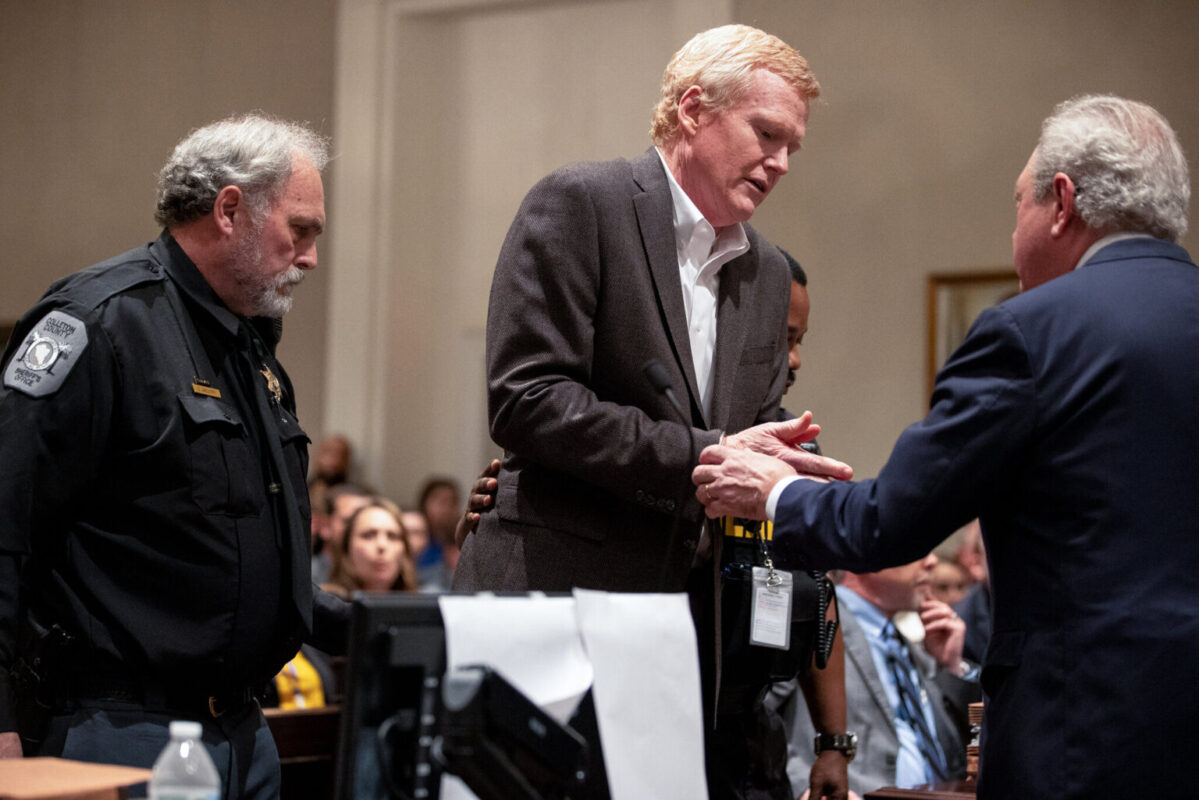Blog
Alex Murdaugh Was Found Guilty of Killing His Son and Wife
Less than three hours after the jury’s deliberations started, the decision was announced. It came after a six-week trial that acted as Mr. Murdaugh’s coming to terms after his life fell apart recently.

WALTERBORO, S.C. Alex Murdaugh, the fourth-generation lawyer whose family long exerted influence in small-town courtrooms across parts of South Carolina, was convicted on Thursday of murdering his wife and son, sealing the dramatic downfall of a man who had substantial wealth and powerful connections but who lived a secret life in which he stole millions of dollars from clients and colleagues and lied to many of those closest to him.
More than 20 months after the fatal shootings of Mr. Murdaugh’s wife, Maggie, 52, and their younger son, Paul, 22, on the family’s rural estate in June 2021, the jury returned a guilty judgment after a trial that lasted almost six weeks. The Murdaugh family has a long and illustrious past. For more than 80 years, they controlled a local prosecutor’s office in South Carolina’s Lowcountry region, and for even longer, they led a significant law firm. As a result, the gruesome crime had reverberated throughout the state.
“Today’s verdict proves that no one, no one — no matter who you are in society — is above the law,” the state attorney general, Alan Wilson, said at a news conference after the verdict.
In finding Mr. Murdaugh guilty, jurors rejected his claim that he had left the dog kennels where the crimes occurred several minutes before the shootings, an assertion Mr. Murdaugh made from the witness stand only as a fallback after prosecutors played a video contradicting his longstanding claim that he had not been there at all. In the critical minute-long video shot at the kennels, Mr. Murdaugh’s voice could be heard in the background. Inadvertently aiding in his father’s conviction, Paul Murdaugh took it during one of his last seconds of life.
According to the prosecution, Mr. Murdaugh shot and killed his son, then shot and killed his wife when she ran over to see what had occurred. According to the prosecution, Mr. Murdaugh immediately began putting together an alibi. He texted and called his murdered wife and visited his sick mother who lived nearby.
As the verdicts were announced in the courtroom, Mr. Murdaugh remained motionless. Buster Murdaugh, his elder son, sat in the courtroom with his hand over his mouth. Buster had previously testified about how upset his father had been following the murders.
The jurors also determined that Mr. Murdaugh had committed two counts of having a weapon while committing a violent crime.
On Friday morning, according to Judge Clifton Newman, he will sentence Mr. Murdaugh. Prosecutors have stated that they will pursue a sentence of life in prison without the chance of parole, even though the minimum sentence for murder is 30 years in prison. One of Mr. Murdaugh’s attorneys, Dick Harpootlian, announced that he intended to challenge the judgment.
The trial was a day of reckoning for Mr. Murdaugh, who had long lived a life of privilege and wealth while avoiding punishment for his theft and lying, which he confessed to on the witness stand.
He earned millions of dollars in legitimate income as a lawyer for his family’s business in some years in addition to the stolen money.
Mr. Murdaugh once wished to carry on the family tradition of his father, grandpa, and great-grandfather by rising to the position of top prosecutor in the area, but he settled for working on a few cases as a volunteer for two decades. Nevertheless, prosecutors claimed that he displayed a prosecutor’s badge on the dashboard of his vehicle and had blue flashing lights installed, demonstrating his belief that he was above the law.
After being accused of numerous financial offenses, including the loss of a total of about $8.8 million, Mr. Murdaugh was disbarred last summer. According to Mr. Murdaugh, he stole the funds to cover his opioid problem, which at times cost him tens of thousands of dollars each week.
On Thursday, a prosecutor, John Meadors, delivered a succinct closing case in rebuttal, pleading with the jury not to accept Mr. Murdaugh’s claims of innocence from the witness stand. Just before 4 o’clock, the jury of seven males and five women got to work.
Since the commencement of the case, motive had been a topic of discussion. The murders were allegedly carried out by Mr. Murdaugh in an unsuccessful attempt to win sympathy and prevent the exposure of his long-running embezzlement, according to the prosecution.
But another of Mr. Murdaugh’s attorneys, Jim Griffin, told the jury on Thursday that it was hard to believe that Mr. Murdaugh would attempt to hide his finances by getting involved in a murder investigation.
Why, why, why would Alex Murdaugh kill his beloved and admired son Paul and his wife Maggie on June 7? Noting the number of individuals who knew the Murdaugh family and gave testimony about their close bond, Mr. Griffin posed the question.
The main prosecutor, Creighton Waters, noted that Mr. Murdaugh acknowledged while testifying that he had made up numerous lies over the years to hide his financial wrongdoings and opioid addiction. Mr. Waters pleaded with the jury not to be the next to fall for his falsehoods. He said, “Don’t let him deceive you too.
Mr. Waters explained to the jury that on the day of the killings, a “perfect storm” had been heading toward Mr. Murdaugh and, consequently, his wife and son. The financial director of Mr. Murdaugh’s law company had confronted him earlier in the day and accused him of keeping a six-figure check that he was supposed to give to the firm for safekeeping.
One of two investigations into Mr. Murdaugh’s finances, according to Mr. Waters, gave him the impression that the walls were closing in. The other was an attempt by a different attorney, Mark B. Tinsley, who had sued Mr. Murdaugh over his son’s participation in an inebriated boat accident that killed a 19-year-old woman in 2019. The officials claimed that Paul Murdaugh was the boat’s captain, and Mr. Tinsley had been requesting that a lawyer compel Mr. Murdaugh to reveal specific financial information so that he could pursue Mr. Murdaugh’s personal assets.
Prosecutors claimed that Mr. Murdaugh’s plan initially succeeded because the investigations into his finances were put on hold for a period of time after the killings. But in September 2021, a worker at his legal firm discovered a missing check in Mr. Murdaugh’s office, which led the company to learn that he had embezzled millions of dollars. He was compelled to resign by them.
Mr. Murdaugh claimed that he had been shot in the head on the side of a country road the following day after a bizarre sequence of events. It turned out that Mr. Murdaugh had actually requested his distant cousin, Curtis Eddie Smith, to kill him, as he later confessed while in a detox facility. In order for his remaining son, Buster, to be able to collect from his insurance policy, Mr. Murdaugh claimed that he had intended to have his death painted as a murder.
The majority of the trial was devoted to proving Mr. Murdaugh’s lies, including the one about not being at the family’s dog kennels, which he repeated to officers in three interviews following the killings.
Last week, Mr. Murdaugh took the dangerous step of testifying in his own defense. He said in tearful evidence that he lied to the police because he was afraid he would be linked to the crime if he admitted to being at the kennels that night. He claimed to have been there only briefly before leaving and driving a short distance to check on his elderly mother. He claimed that when he came back an hour or so later, his family was deceased.
On Thursday, Mr. Griffin explicitly addressed Mr. Murdaugh’s initial statements to the police, stating that the video from the kennels ended up serving as the case’s main source of support in the absence of any other supporting documentation. However, he claimed that as a long-term drug user, Mr. Murdaugh had grown acclimated to lying.
Mr. Griffin pointed to his client, who was seated at the defense table in a brown blazer and a white shirt, attentively observing the proceedings. “Frankly, he probably wouldn’t be sitting over there if he had not lied,” Mr. Griffin said. He lied because that’s what junkies do, Mr. Griffin continued. Addicts fabricate. He lied because he kept skeletons in his vault.
Mr. Murdaugh’s attorneys argued throughout the trial that the police had conducted a shoddy investigation and had concentrated almost entirely on Mr. Murdaugh rather than searching for other suspects. According to Mr. Griffin, the police investigation is being guided by the idea that “Alex will be the suspect unless we find someone else.”
In his testimony, Mr. Murdaugh expressed the opinion that the murders were likely committed by a vengeful individual over the boat accident.
In his closing remarks, Mr. Griffin went over the issues with the investigation, such as the fact that the lead agent, David Owen of the South Carolina Law Enforcement Division, provided the grand jurors who indicted Mr. Murdaugh false information about guns discovered on the property. A more thorough set of tests conducted later revealed no blood, contrary to what the police had been led to think for months. He also mentioned that Mr. Murdaugh’s shirt had been found to be blood-free.
Additionally, he criticized the prosecution’s assertion that Mr. Murdaugh’s contradictory statements about the sequence of his movements indicated that he was the murderer.
“What do you think he saw?” As he described Mr. Murdaugh returning home to discover his wife and son murdered, Mr. Griffin choked back tears. “And the fact that he can’t recall what the sequencing was at that precise time is proof of guilt? Is that proof of culpability or is it proof of trauma?
But Mr. Waters repeatedly pressed Mr. Murdaugh on his earlier lies while he was testifying, implying that he was also lying to the jurors and asking him if he had looked his clients in the eyes when he stole their money.
